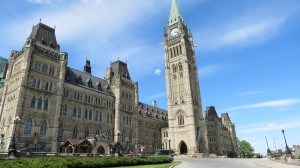
The federal government has committed to repealing legislation that has bogged down labour negotiations for years, but the union representing Parks Canada employees remains skeptical about the government’s commitment.
According to the Public Service Alliance of Canada, Parks employees have been working without a contract since Aug. 4, 2014.
The last time representatives from Parks and the union sat down at the bargaining table was Oct. 8, 2015, in the middle of the federal election. So far no meetings have been scheduled for 2016.
“We are extremely, and I need to emphasize this, extremely early in our negotiation process,” said Kevin King, national executive vice-president with the union of national employees.
“We’ve only had three face-to-face meetings with the employer since demands were exchanged in late 2014.”
He said it’s not unusual for negotiations to continue past the expiry date of the previous contract, citing several other federal departments in similar situations.
Part of the reason contract negotiations have failed to achieve much of anything over the past 18 months is because the former Conservative government imposed legislation that gave it the power to bypass collective bargaining and unilaterally impose a new disability and sick leave regime.
“The employer wants to take the sick leave proposal outside of the collective agreement and that is a big problem for us, because it really restricts our ability for recourse,” said King.
According to King, the government wants to let a third-party service provider—such as an insurance company—oversee the disability and sick leave regime.
“If an employee makes an application to an insurance company for a short-term disability, for example, not only can a company dismiss that claim outright, but the employer can also apply for an intervener status for any reason, a reason not confined in the collective agreement,” said King.
Despite the open animosity between the government and public sector unions, signs out of Ottawa indicate the Liberal government wants to hit the reset button to improve labour relations and get back to the bargaining table.
In January, Treasury Board President Scott Brison promised to repeal division 20 of Bill C-59 that gave the Conservative government the power to unilaterally impose a new disability and sick leave system.
As a result, the union has promised to postpone its constitutional challenge to stop the bill.
While both sides appear ready to negotiate, King�� pointed out that repealing division 20 of Bill C-59 is different from withdrawing the demand from the negotiation table.
“If the treasury board withdraws that from the core public negotiation tables, agencies such as Parks Canada will likely follow, but we are taking absolutely nothing for granted. We have to wait to see what the narrative is at the negotiation table,” said King.
He reiterated several times that it’s too early to say what will happen.
“Whether they withdraw those proposals from the bargaining table it’s too early to say. They have to physically withdraw those proposals while the treasury board is sitting at the negotiation tables, that is the proof of the pudding and they haven’t yet,” said King.�� ��
When reached for comment, Parks remained tight lipped about the negotiations.
“The Government of Canada has recently tabled a new proposal for disability management. It would be inappropriate to comment beyond what has already been reported widely in the media,” wrote Natalie Fay, a spokesperson for Parks Canada, in an email.
“Parks Canada appreciates the respectful and constructive relationship it has with the Public Service Alliance of Canada. Through all-parties collaboration, the Agency continues to work in order to achieve a collective agreement that is fair to both our Parks Canada Agency team members and the Canadian taxpayers,” wrote Fay.
Amongst the concessions proposed by Parks in December 2014 was an end to accumulated sick leave, wage increases of 0.5 per cent every year and an increase in the length of the contract from three years to four.
In February 2015, the union rejected all of the concessions proposed by Parks.
Currently, full-time Parks employees can take 15 sick days a year and bank any unused days. Doing the math, over a 35-year career, a full-time public servant can earn 525 days in sick leave.
According to a report tabled by the treasury board last year, public servants used an average of 11.5 days of sick leave a year—which means the average employee is also banking about 3.5 days a year.
Paul Clarke [email protected]
